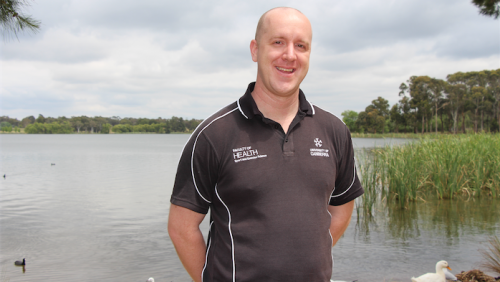
GOING for a walk around a lake or eating lunch by a pond can help boost mood, self-esteem and positivity, according sport and exercise psychologist Richard Keegan.
The University of Canberra associate professor says while water is pivotal for hydration, research shows being around water and out in nature can also boost mood.
“We forget we respond well to nature,” says Richard, 38, of Flynn.
“One of the theories is that being in nature is easier on your attention.
“Nature lets you relax and lets your mental system recharge.
“You can recharge because things aren’t competing for your attention.”
Natural sources of water might be harder access by 2050 with research predicting half the population will be in cities.
“But the interesting thing is it doesn’t take much and it could be as simple as a small pond,” he says.
“It’s about trying to trigger that perception of irregular noises and patterns.”
Richard uses tasks such as walking the dog as something to hold him accountable and get him out in nature.
“I make a point of trying to take that time everyday to get off the tarmac and on to a footpath,” he says.
He particularly likes seeing the sparkle in the water as he cycles around Lake Ginninderra or Lake Burley Griffin with his family and says exercising amplifies some of the known positive effects of being out in nature.
“And assuming we notice these effects then that should be more motivating [to exercise] as obviously it would be positive reinforcement of the behaviour,” he says.
“[But] people have lost touch with being active in nature.
“Try have your lunch by water or plan a walking meeting. Tiny little things add up.”
Richard says having connections to nature and often water isn’t a new idea and highlights its importance in indigenous cultures in Australia and in North America.
“Those traditions that tend to view humans as custodians and simply part of nature (rather than owning and even ‘dominating’ or controlling nature) tend to have important cultural ties to places,” he says.
“And, of course, bodies of water are very prominent and valuable geographical features to incorporate into such traditions.”
Richard also points out how water is used in religions such as Abrahamic religions where elements of water are involved in important ceremonies such as baptisms.
“Various religions also include pilgrimages, too, which often necessitate spending time in nature either in solitude or as part of a journey to get somewhere,” he says.
Who can be trusted?
In a world of spin and confusion, there’s never been a more important time to support independent journalism in Canberra.
If you trust our work online and want to enforce the power of independent voices, I invite you to make a small contribution.
Every dollar of support is invested back into our journalism to help keep citynews.com.au strong and free.
Thank you,
Ian Meikle, editor





Leave a Reply